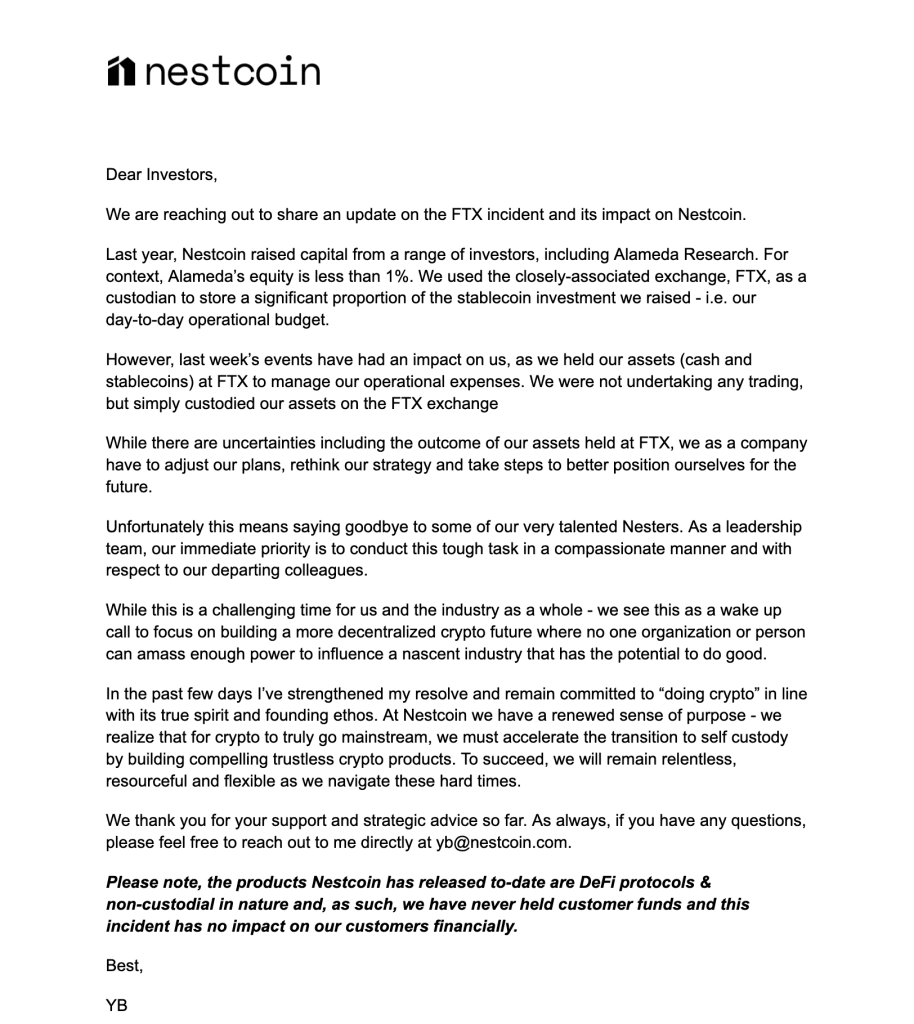African Web3/Crypto Startup Nestcoin Lost Capital To The FTX Collapse—Laying Off Staff

Nestcoin, a startup founded last November that announced a USD 6.45 M pre-seed in February to build, operate and invest in web3 applications with Africa and frontier markets in mind, lost a chunk of its operating capital to the FTX collapse and is laying off staff following last week’s dramatic implosion of FTX, which before its fast demise was among the world’s top three crypto exchanges.
Yele Bademosi, founder/CEO of Nestcoin shared in a just-released communication (see below) that a significant portion of the stablecoin investment it raised which forms its day-to-day operating budget was held on FTX. That capital has now become inaccessible following the extraordinary events of the past week. As a result, Nestcoin is letting go of some employees as it makes adjustments in the hopes of figuring out a path forward.
The FT revealed in its reporting which cited investors and sources at the company that Nestcoin held about USD 4 M on FTX, which represents nearly all the remaining funds it had raised. The CEO’s communication maintains that Nestcoin did not engage in trading and it does not hold customer assets given the non-custodial nature of the products it has rolled out to date.
Following the upheaval, Nestcoin is laying off at least half of its nearly 100-strong workforce, according to the FT, while implementing furloughs and pay cuts across the rank and file, with special on-and-off arrangements in some cases. The founder says the setback is devastating but also fuels resolve and underlines the need to build a more decentralised, self-custody-led crypto future.

Nestcoin set out to make crypto and its opportunities mainstream in Africa through its interests in crypto-gaming, decentralised finance (DeFi), media, and digital art, as well as investments in a number of startups including Lazerpay which does crypto payments.
The startup is backed by several investors (around 19 or so funders) among which are local funds and foreign investors. The latter group include Alameda Research, the sister trading arm of FTX which is strongly implicated in the web of misdeeds that took down the exchange that was valued at USD 39 B before the implosion.
An unholy alliance between FTX and Alameda is reported to have culminated in the mishandling of user funds and various other forms of blatant financial impropriety all of which tanked the one-time crypto industry behemoth led by the now-infamous Sam Bankman-Fried whose net worth of USD 16 B and glowing image in the media has quickly dissipated. Billions of dollars of customer funds have been reported missing as a result of sharp practices orchestrated by Bankman-Fried and his camp.
Alameda took a small stake (less than 1 percent equity) in Nestcoin, according to Bademosi, and Nestcoin used the closely-associated exchange, FTX, as a custodian to hold a sizeable portion of its operational budget.
Bademosi, a former executive at Binance’s venture arm and co-founder of venture funder Microtraction and crypto startup Bundle, also maintains that Nestcoin essentially used FTX as a checking account for its operating expenses and that it did not trade. The unravelling of FTX and associated companies in the past week have, however, plunged the startup into uncertainty.
FTX and Alameda also invested in other African startups, leading the USD 150 M series C extension closed by the African fintech unicorn, Chipper Cash, as well as additional investments in Bitnob and Mara, while also establishing a relationship with AZA Finance (formerly Bitpesa).
While Bitnob has since issued a statement declaring that it is unaffected by the FTX contagion, there are murmurs that the startups that raised equity from Alameda likely held some of their assets with FTX like Nestcoin and may now face problems.
On its part, Nestcoin had invested in its own projects such as Breach (media) and Metaverse Magna (MVM, a fledgling crypto-gaming venture that raised USD 3.2 M at a USD 30 M valuation in September), and it is quite likely that the staff cuts would extend to these entities.